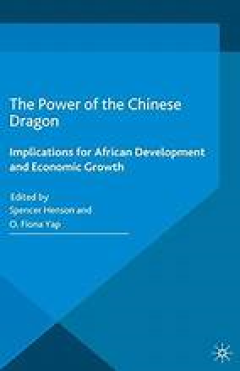Filter by

The Development of the Chinese Financial System and Reform of Chinese Commerc…
The Chinese financial sector, despite having been developed at a much later stage compared with other developed nations, has achieved substantial progresses over the past decades. By the end of 2014, a total of 16 commercial banks had been listed on the stock exchanges, exerting strong impact onto the market indices and contributing significantly to the country's sustained economic growth. This…
- Edition
- 1
- ISBN/ISSN
- 978-1-137-45466-9
- Collation
- XIII, 247,
- Series Title
- The Nottingham China Policy Institute Series
- Call Number
- -

A European Social Union after the Crisis
Today, many people agree that the EU lacks solidarity and needs a social dimension. This debate is not new, but until now the notion of a 'social Europe' remained vague and elusive. To make progress, we need a coherent conception of the reasons behind, and the agenda for, not a 'social Europe', but a new idea: a European Social Union. We must motivate, define, and demarcate an appropriate notio…
- Edition
- -
- ISBN/ISSN
- 9781108235174
- Collation
- -
- Series Title
- -
- Call Number
- -

The Public Economy in Crisis
This Brief proposes a new theory of public economics which deemphasizes reliance on the free market and affirms the importance of public goods and services within the context of the democratic process and constitutional governance. Public non-market production makes up from a quarter to more than half of all economic activity in advanced democratic nation-states. Yet by imposing market precepts…
- Edition
- 1
- ISBN/ISSN
- 978-3-319-40487-5
- Collation
- XV, 128, 3 b/w illustrations, 4 illustrations in colour
- Series Title
- SpringerBriefs in Economics
- Call Number
- -

The Property Tax in China
This monograph offers a detailed analysis of the creation, pilot implementation, and possible wide adoption of the real property tax at the local level in China. Starting in 2003, as China’s economy gradually recovered from the Asian financial crisis that started in 1998, the real property market entered a period of rapid expansion, followed immediately by rampant speculation, rising housing …
- Edition
- 1
- ISBN/ISSN
- 978-3-319-10049-4
- Collation
- XVII, 186, 39 illustrations in colour
- Series Title
- Development and Governance
- Call Number
- -

The Power of the Chinese Dragon
This important reader brings together published articles from Palgrave's journal The European Journal of Development Research on the development between China and Africa as well as emerging national economies in the BRICs group. Topics include trade relations, investment in sub-Saharan Africa, global politics of development and more.
- Edition
- 1
- ISBN/ISSN
- 978-1-137-57449-7
- Collation
- XII, 275
- Series Title
- Palgrave Readers in Economics
- Call Number
- -

The Political Economy of Fiscal Consolidation in Japan
This book investigates the reasons for persistent public deficits and delayed fiscal reform in Japan, placing a special emphasis on political economy aspects. Japan is confronted with the need to pursue fiscal discipline for fiscal consolidation and implement structural reforms for reorganizing fiscal expenditures. Focusing on particular policy fields including social security, female labor sup…
- Edition
- 1
- ISBN/ISSN
- 978-4-431-55127-0
- Collation
- XIII, 195, 26 b/w illustrations, 16 illustrations in colour
- Series Title
- Advances in Japanese Business and Economics Advances in Japanese Business and Economics
- Call Number
- -

The Political Economy of Anti-dumping Protection
This book deals with anti-dumping measures (AD) and investigates two questions: First, what country characteristics affect AD use and notably, do domestic political institutions have an effect? Second, (how) is the decision to impose a new AD measure affected by anticipation of trading partners’ potential retaliation? This book applies a strategic perspective to AD to address these questions,…
- Edition
- 1
- ISBN/ISSN
- 978-3-319-11224-4
- Collation
- XI, 167, 16 b/w illustrations
- Series Title
- Contributions to Economics
- Call Number
- -

A European Social Union after the Crisis
Today, many people agree that the EU lacks solidarity and needs a social dimension. This debate is not new, but until now the notion of a 'social Europe' remained vague and elusive. To make progress, we need a coherent conception of the reasons behind, and the agenda for, not a 'social Europe', but a new idea: a European Social Union. We must motivate, define, and demarcate an appropriate notio…
- Edition
- -
- ISBN/ISSN
- 9781108235174
- Collation
- -
- Series Title
- -
- Call Number
- -

A European Central Bank? Perspectives on Monetary Unification after Ten Year…
This volume, based on a conference held by the Italian Macroeconomic Policy Group and the centre for Economic Policy Research, examines the issues raised by European monetary unification. An introduction describes recent monetary developments and identifies the motivations for creating a European central bank. Theoretical papers analyse the interactions of capital controls, financial intermedia…
- Edition
- -
- ISBN/ISSN
- 9780511628504
- Collation
- -
- Series Title
- -
- Call Number
- -

The Political Economy of Anti-dumping Protection
This book deals with anti-dumping measures (AD) and investigates two questions: First, what country characteristics affect AD use and notably, do domestic political institutions have an effect? Second, (how) is the decision to impose a new AD measure affected by anticipation of trading partners’ potential retaliation? This book applies a strategic perspective to AD to address these questions,…
- Edition
- 1
- ISBN/ISSN
- 978-3-319-11224-4
- Collation
- XI, 167, 16 b/w illustrations
- Series Title
- -
- Call Number
- -
 Computer Science, Information & General Works
Computer Science, Information & General Works  Philosophy & Psychology
Philosophy & Psychology  Religion
Religion  Social Sciences
Social Sciences  Language
Language  Pure Science
Pure Science  Applied Sciences
Applied Sciences  Art & Recreation
Art & Recreation  Literature
Literature  History & Geography
History & Geography